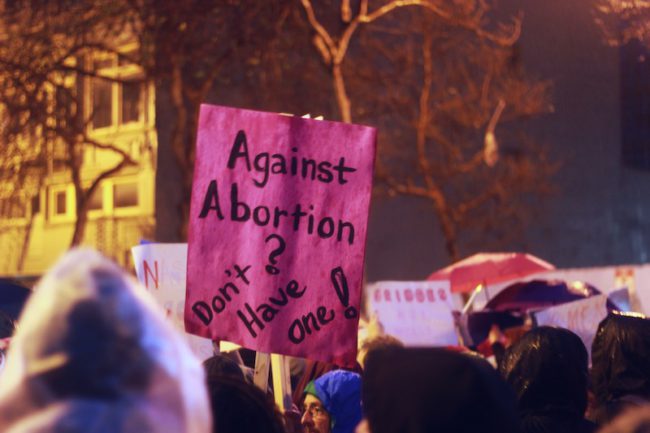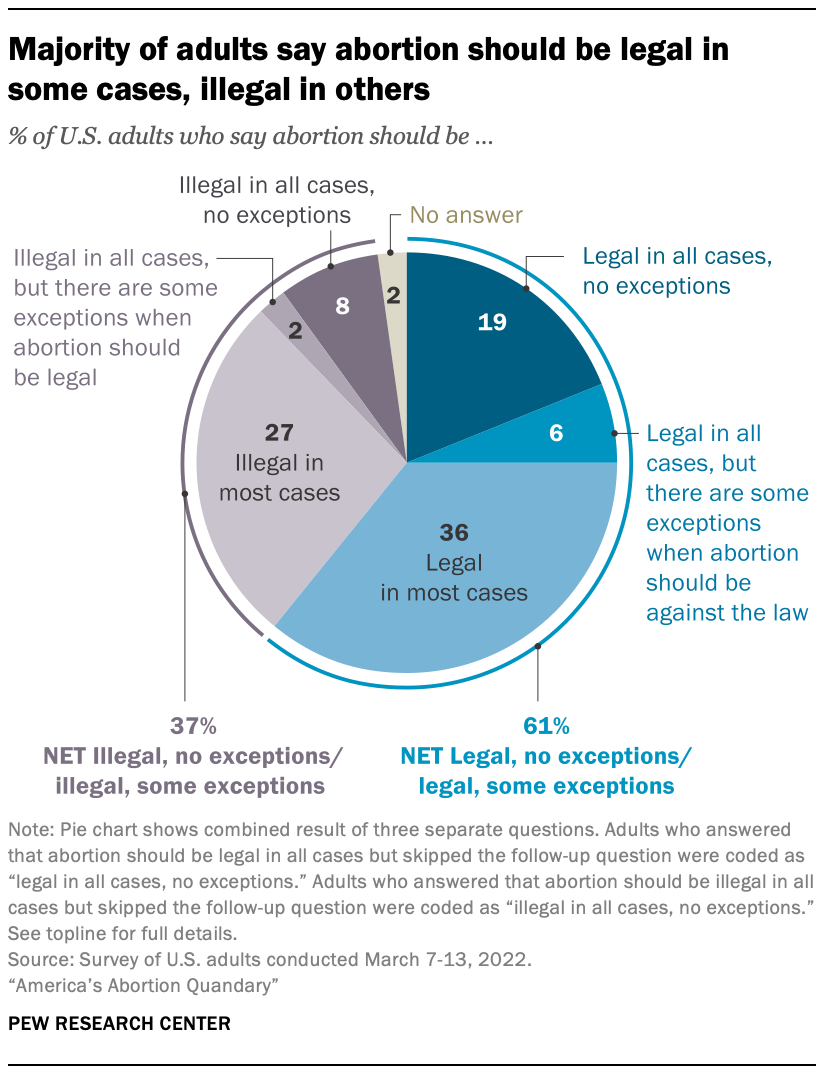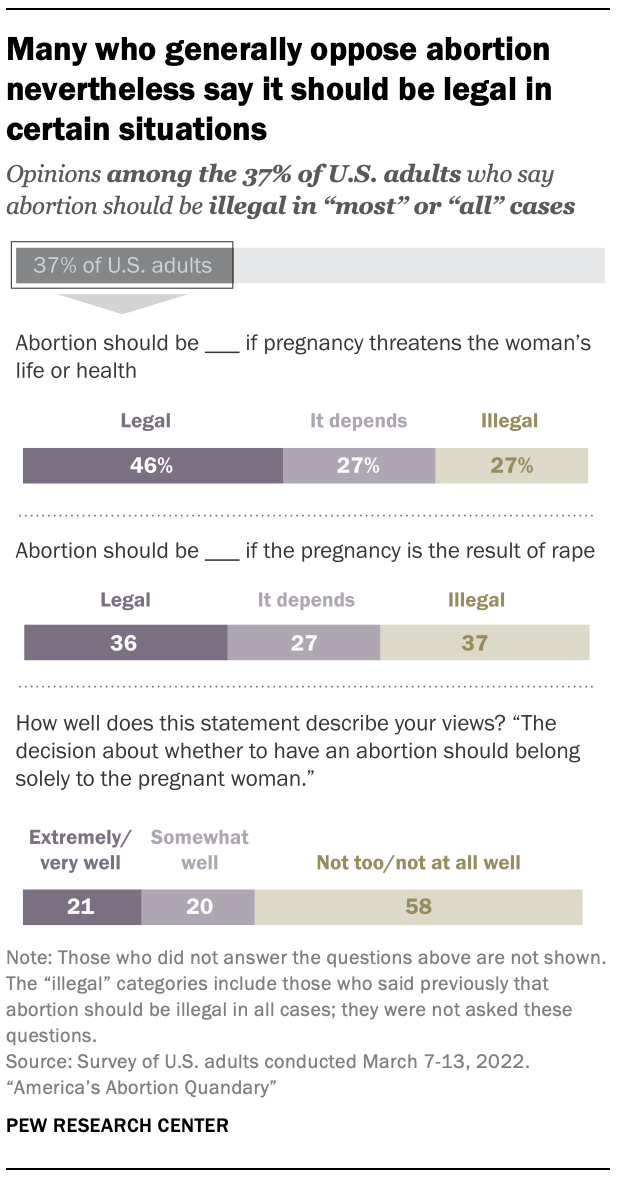
We need not guess, there is recent data available. On May 6, Pew published the details.
Titled “America’s Abortion Quandary“, the byline under that title sums it up as follows …
A majority of Americans say abortion should be legal in all or most cases, but many are open to restrictions; many opponents of legal abortion say it should be legal in some circumstances
They gathered their insights by surveying 10,441 U.S. adults from March 7-13, 2022. As they are crunching the results the May 3 Supreme court draft ruling was published by Politico. Realising just how relevant they data was, after a few days of frantic effort to polish it off then then put their results out.
How Solid is the Partisan Split
A common belief is that those that embrace a political or religious identity will also tend to have beliefs and opinions that align with that identity.
The truth is summed up with two familiar words – it’s complicated.
As an example, if you meet somebody who identifies as Catholic then you might anticipate that they generally embrace Catholic positions. This thought is wrong, it is often not like that at all. The official Catholic position regarding the use of contraception is that it is “intrinsically evil”. In reality, the vast majority of US catholics use contraception, and also embrace the view that they are still good Catholics.
Abortion is one of those topics that tends to bring a great deal of fuzziness into play. Many embrace an identity that is officially opposed, and yet they don’t personally hold the officially promoted position.
So what are the Numbers via Pew?
The pew report has a great deal of nuanced detail, so I’ll pull out a couple of the key insights …
First key point – the majority, 61%, support the right to choose in “most” or “all” cases….

Given what has happened, I’m sure you are already up to speed on that.
Now this next bit is interesting.
What if we consider those who don’t think it should be a choice for “most” or “all” cases?
Here we discover there is no universal opposition, but instead there are degrees of tolerance when you spell out various scenarios such as these …
- The case where the mother will die without an abortion
- The case of rape
Even here we find sizeable numbers of people who do support abortion …

To be honest, the one that blows my mind is the 27% who feel that being pregnant should be a death sentence for some.
Let’s work a real example of exactly this.
In Ireland, before they reformed things, Catholic church doctrine prevailed and so there was a total ban on abortion. Obviously it still happened, many simply jumped on the three hour ferry ride to the UK and so it happened, but that is not the example I wish to cite. The case back in 2012 concerns Savita Halappanavar. Rather obviously she was not Catholic, yet the law applied anyway. This is what happened …
- When admitted to hospital complaining of pain, they discovered that because of medical complications a miscarriage was unavoidable
- Her water broke, but the foetus remained inside her
- She discussed an abortion with medical staff but due to the blanket ban on abortions they refused and would not do it
- She developed sepsis and died at the age of 31 – cause of death : fanatical religious ignorance.
You can read a lot more detail about this case on the Wikipedia page that covers it.
It was this needless and very preventable death that eventually led Ireland to repeal their Eighth Amendment that banned abortion. That happened in 2018 with a 66% voting for that to happen. The Irish Health Act of 2018 now carries these provisions …
...terminations to be carried out up to 12 weeks of pregnancy; or where there is a risk to the life, or of serious harm to the health, of the pregnant woman; or where there is a risk to the life, or of serious harm to the health, of the pregnant woman in an emergency; or where there is a condition present which is likely to lead to the death of the foetus either before or within 28 days of birth.
So my question to the 27% is this – If indeed a life saving procedure in cases where the foetus is not viable and not having an abortion will lead to the death of the mother, then please do explain exactly how that is “Pro-Life”?
In the absence of any reasonable explanation, the only conclusion we can all come to does not exactly cause the 27% to shine in a moral light.
What is the debate?
What should happen, where is the boundary between freedom, personal choice, and the intervention by authorities on the issue of abortion?
The essence of it all is this …
- Pro-choice = the decision may only be made by the women, the state has no moral right to interfere
- Pro-life = from the moment of conception the embryo is human and so we have a moral obligation to preserve life. An abortion is murder.
How can we choose between these two positions?
Let’s think about each
If you kill a baby one day after it is born, then that would be universally recognised as murder. What if you killed the foetus one day before it was born?
That is a very disturbing question to ponder over.
Over the nine months a couple of cells develop into the baby that is born. It is very rare for an abortion to happen during the last three months of pregnancy. Such instances take place because of the real threat to the life of the mother.
If indeed the moment of conception is where you draw the line, then that would imply that a miscarriage is on par with man-slaughter. The claim that life begins at conception faces the rather obvious challenge that humans don’t hold funerals for a miscarriage.
If we flip the “one day prior to birth vs one day after birth question” over to the other end of the scale, then how do we handle the fact that most fertilised eggs are spontaneously miscarried. Do the pro-life crowd consider this to be mass slaughter?
Obviously they don’t, nobody would.
Is masturbation mass murder, have millions of potential humans died?
Another challenge is this. If indeed the pro-life folks were truly motivated to reduce the number of abortions then should they not encourage decent sex education and easy access to birth control? Doing that would greatly reduce abortion rates. If you simply ban it, all you actually do is to push it underground.
Generally those opposed to abortion are also generally opposed to birth control as well. That raises a deep suspicion within many minds that the motivation for the stance is not driven by any moral imperative to preserve life, but rather by a desire to control the independence and sexuality of women.
Where can we draw a line between conception and birth?
The claim that life starts at conception is rather obviously nonsense. Every sperm and every egg is itself life, they are living cells. They are also clearly not humans. You can literally freeze sperm and eggs for decades, then thaw them out and use them to help those who took this preservation step because, for example, cancer treatment obliterated their chance for parenthood and so freezing was their literal life raft. The point is this – You can’t freeze humans and then thaw them out later. We are obviously not dealing with humans at this stage.
So when does the dot of a fertilised egg become human, where do you cross the line between being human and not being human?
The big challenge is that wherever you draw the line between always and never will be arbitrary.
This is the decision that RowV. Wade faced back in 1973.
This is what was decided then …
- First trimester – no restrictions
- Second trimester – some restrictions
- Third trimester – grants states the right to forbid except in instances where the life or heath of the women is at risk
Wipe away Roe and pass the buck back to each of the state legislatures and you are in effect asking them to make this decision.
What Roe V. Wade granted was a compromise between never and always, and enshrined that into law. Removing that brings chaos, turmoil, intolerance, religious bigotry, and much much more.
The Recent Evangelical Discovery of “Pro-Life”
It is perhaps a shocking discovery for some to discover that in the not too distant past evangelicalism was actually Pro-choice.
Related to that is the oft-repeated myth that the religious-right emerged in response to Roe V. Wade in 1973 because they were so enraged by it.
The historical facts are that the anti-abortion stance was not adopted by evangelical leaders until well into the 1980s, and even then it was not done due to moral outrage, but as a means to rally the flocks to vote against a second Jimmy Carter term. The only religious group that actually had any concern regarding Roe V. Wade were the Catholics.
If you want to understand why the religious right really emerged as a political force, then you might be interested in a fascinating article written by Randall Balmer back in 2014. Briefly, the quick summary is that it was racism and the deep desire to protect segregated schools.
In Summary
The vast majority of the public support abortion. Only a small minority of religious people are opposed.
What should you do if you don’t support abortion?
The answer is simple, don’t get an abortion.